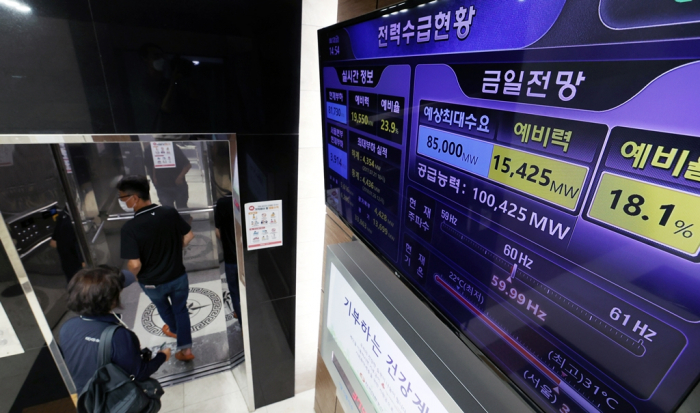Economy
Rising utility bills add to Korea’s inflationary pressure
The Bank of Korea says the inflation may not peak in the second half, given the sustained war in Ukraine
By Sep 08, 2022 (Gmt+09:00)
2
Min read
Most Read
LG Chem to sell water filter business to Glenwood PE for $692 million


Kyobo Life poised to buy Japan’s SBI Group-owned savings bank


KT&G eyes overseas M&A after rejecting activist fund's offer


StockX in merger talks with Naver’s online reseller Kream


Mirae Asset to be named Korea Post’s core real estate fund operator



South Korea may raise utility bills after scheduled hikes in the coming months, adding to inflationary pressure in Asia’s fourth-largest economy.
The basic fuel cost for electricity charges is set to increase by 4.9 won (0.4 cent) per kilowatt-hour (kWh) next month, according to the Ministry of Trade, Industry and Energy and state-run Korea Electric Power Corp. (KEPCO). The government in late 2021 decided to jack up the basic fuel cost by a total of 9.8 won this year with a raise of 4.9 won each in April and October.
City gas bills are also poised to rise from October with the settlement unit price up to 2.3 won per megajoule (MJ) from 1.9 won.
Those utility expenses may rise further as the recent surge in liquefied natural gas (LNG) prices ramped up wholesale prices of power and gas. That could cause prices of electricity and city gas to soar more than 20% next month.
INFLATION MAY NOT PEAK IN H2
The Korea Gas Corp. (KOGAS) gas wholesale price for September more than doubled to 144,634 won per gigacalories (Gcal) from a year earlier. The price was up 13.4% on-month. That came as Russia cut off the natural gas supply to Europe, prompting countries in the region to scramble for the fuel.
Higher gas prices increased the wholesale price of electricity with the System Marginal Price (SMP) hitting a record high of 245.4 won on Sept. 6.
The Bank of Korea said on Sept 8. in a report to lawmakers that it sees risks that inflation may not peak in the expected second half, given the sustained military conflict in Ukraine, although it still expects the consumer price increase to culminate later this year.
The BOK reiterated that the monetary authority needs to raise interest rates further as the country may keep suffering from high inflation.
Consumer prices increased 5.7% last month from a year earlier, lower than a 24-year high of 6.3% in July, but the central bank is still predicted to increase borrowing costs. Late last month, BOK Governor Rhee Chang-yong told The Korea Economic Daily that it plans to keep tightening until inflation falls to around the 2% target.
The country will consider the rampant inflation when it decides on further hikes in utility bills, but the government may not be able to ignore the deteriorating profitability of KOGAS and KEPCO, with the state-run electricity producer forecast to report a loss of more than 30 trillion won this year.
Write to So-Hyeon Kim at alhpa@hankyung.com
Jongwoo Cheon edited this article.
More to Read
-
 EconomyKorea inflation slows, but BOK may still hike interest rates
EconomyKorea inflation slows, but BOK may still hike interest ratesSep 02, 2022 (Gmt+09:00)
2 Min read -
 Central bankBOK chief: S.Korea won't keep pace with Fed’s interest rate hikes
Central bankBOK chief: S.Korea won't keep pace with Fed’s interest rate hikesAug 29, 2022 (Gmt+09:00)
3 Min read -
 Central bankBOK delivers fourth straight rate hike as inflation persists
Central bankBOK delivers fourth straight rate hike as inflation persistsAug 25, 2022 (Gmt+09:00)
3 Min read -
 EconomyKorea inflation hits highest point since 1998 crisis, BOK to hike rates
EconomyKorea inflation hits highest point since 1998 crisis, BOK to hike ratesAug 02, 2022 (Gmt+09:00)
3 Min read
Comment 0
LOG IN


